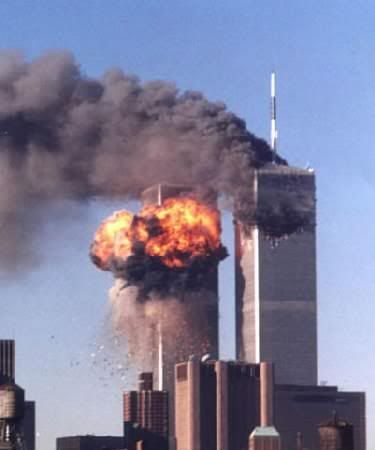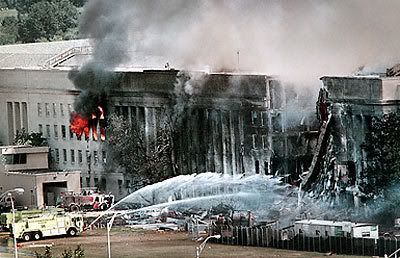“To be incapable of committing mayhem is not the mark of the civilized,
merely the domesticated.” – Trefor Thomas (Usenet)
“Cry ‘Havoc,’ and let slip the dogs of war.” – Wm. Shakespeare, Julius Caesar
According to this website:
The military order Havoc! was a signal given to the English military forces in the Middle Ages to direct the soldiery (in Shakespeare’s parlance ‘the dogs of war’) to pillage and chaos.
I’m pretty sure that the words “rape and slaughter” are politely left out of that “pillage and chaos” description only because it’s a family internet.
Settle in and get comfortable, ladies and gentlemen, or click on to other destinations. This promises to be another epic-length post.
I want to talk about the war in Iraq.
I’m one of the people personally convinced that upon election (or “selection,” depending on your personal biases) of George W. Bush to the office of President in November of 2000, America was on the path to war in Iraq. I firmly believe that “regime change” was a cornerstone of the Bush presidency, even though he did not announce it during his campaign.
And honestly, I was fine with that. Let me explain why.
If you have not seen it, or if it’s been a while, I strongly urge you to read Steven Den Beste’s Strategic Overview explaining how he saw the root causes of the conflict between radical Islam and the West, and the solution to it. Bear in mind, Steven wrote his piece in July of 2003, after the invasion of Iraq, but most of the background information was true long before 9/11/2001, and that post was essentially a distillation of many posts he’d written much earlier. If you have any disagreement with his initial root-cause analysis, watch this YouTube clip of a Palestinian children’s television show.
As I detailed in an earlier piece, A Terrible Resolve, we have been at war for quite a while with radical Islam. We’ve just pretended not to notice.
Many opponents to the invasion of Iraq pointed out that Saddam’s government was secular. It was not a country ruled over by robed and turbaned religious zealots, it was ruled over by a run-of-the-mill psychotic dictator, and, the complaint went, we knew how to deal with those. Iran and Saudi Arabia were where the self-immolating neolithic goatherds in Semtex Underoos[*] were being inspired and financed from, why not attack one of them? Others counseled that we should handle the problem like our elder and more sophisticated cousins in Europe did – just live with the intermittent carnage, attempt appeasement, or – if we must be cowboys – lob a few bombs or missiles at suspected terrorist camps in response. After all, it was what we’d been doing for decades. Why change now? It’s not like Saddam was a real threat or anything.
Steven spells out the reason for a military response against Iraq in realpolitik terms, but here’s my summary: “Sitting and taking it” is not, for many Americans, an option. It was obvious prior to 9/11 that terrorist operations were getting larger and more sophisticated. The original truck-bomb attack against the World Trade Center in 1993 was just a taste of domestic things to come. With the demise of the Soviet Union in 1991 and the simultaneous collapse of the economies of its member nations, the possibility of military-grade chemical, biological, or even nuclear weapons falling into the hands of jihadists was significantly increased. Saddam, we knew, possessed chemical weapons that he had used on Iranians and Kurds. Everyone expected that Coalition troops would be at least gassed by Saddam’s forces in the 1991 Gulf War. That was another argument against not only the 2003 invasion, but the Gulf War as well (how soon we forget.) We believed, as did the rest of the world, that he was pursuing both biological and nuclear weapons. The only topic of debate was “how long?”
Twelve years of UN sanctions against Iraq, twelve years during which he violated the terms of surrender and repeated UN (ir-)resolutions, did nothing – so far as we were able to determine – more than slow him down. In the mean time, Saddam and his sons Uday and Qusay managed to take advantage of that wretched hive of scum and villainy that is the UN and suborned Germany, France, and cash-starved Russia, not to mention a big chunk of Kofi Annan’s staff and family. “Oil for Food” became “Oil for Palaces,” and international aid organizations and other NGOs were getting closer and closer to their goal of having the UN drop the sanctions against Iraq “for the children.” That move would have left Saddam in power with his even less stable sons in line for the chair, and that was not an option that I believe George W. Bush nor Richard Cheney had any intention of allowing to come to pass as far back as November 2000. It was, absolutely, a question of U.S. National Security. And as far as I can determine, the only candidate for Presidential office in 2000 actually willing to be proactive about Saddam was Bush.
Fellow blogger Markadelphia of Notes from the Front left a comment here on another post where he says:
It was very clear long before 9-11 that we were going into Iraq. The people that helped elect Bush were tired of being at the little kids table behind Germany, France, and Russia in regards to Iraqi oil. Cheney spent 1993-2000 at Haliburton planning to go to war with Iraq to a)get their oil and b)use KBR (subsidiary of Haliburton) to fleece taxpayers like you and I with overly generous defense contracts. He reset the table and he used 9-11 as a pretext for going there.
So it was even clear to others that Iraq was on the agenda prior to 9/11. But was it for the Ooooiiiillllll!!!!!? Oh bullshit. If we wanted Iraqi oil, we’d have gone ahead and dropped the sanctions and simply bought it. If we went to war to steal it, then where the hell is it, and why does my gas cost $3.03 a gallon? Are contractors raking in big bucks in Iraq? Yes they are, but they’re doing it in Afghanistan, too – and Afghanistan is the good war, remember? What about Kosovo? KBR is big there and has been from pretty much the beginning. Wasn’t there a Clinton involved in that one?
But yes, it is about oil. If the world’s primary reserves of crude were not under the Middle East, we wouldn’t be having this discussion. The radical Islamists wouldn’t have two dimes to rub together with which to prosecute their war against the West, and we wouldn’t give a dead dog fart about them. Oil is the life blood of the industrial world. Having certifiably insane people sitting in a position that allows them to deny it to the world is manifestly not a good idea.
In order to end the conflict between the West and radical Islam, it is necessary to do one thing: destroy radical Islam. There are two paths to this end. One is, as Steven says, reform the Arab/Muslim world and undermine its support. The second is the unthinkable – destroy it by force of arms.
Therefore I firmly believe that the Bush administration shambled into office with the intent to evict Saddam Hussein and his power structure from Iraq, and to attempt to build a modern democratic nation in the middle of the region. The realpolitik reason for the act was because it would be the opening maneuver in the effort to reform the Arab/Muslim world. The legal and moral justification for the act was that Saddam remained a real if not “imminent” danger, was in violation of the UN resolutions passed against him, and was in violation of the terms of surrender from the 1991 Gulf War. Further, as Iraq was run by a secular government, we could not be credibly accused of attacking for religious reasons. We could not put forth a similar argument for attacking Iran, and the Saudis are supposedly our friends. Attacking them was no option at all. And there was no acceptable diplomatic solution. Twelve years of “diplomacy” conclusively proved that.
Iraq was the target, as Steven says, because in order to begin to reform the Arab/Muslim world:
(W)e had to conquer one of the big antagonistic Arab nations and take control of it.
- To directly reduce support for terrorist groups by eliminating one government which had been providing such support.
- To place us in a physical and logistical position to be able to apply substantial pressure on the rest of the major governments of the region.
- To force them to stop protecting and supporting terrorist groups
- To force them to begin implementing political and social reforms
- To convince the governments and other leaders of the region that it was no longer fashionable to blame us for their failure, so that they would stop using us as scapegoats.
- To make clear to everyone in the world that reform is coming, whether they like it or not, and that the old policy of stability-for-the-sake-of-stability is dead. To make clear to local leaders that they may only choose between reforming voluntarily or having reform forced on them.
- To make a significant long term change in the psychology of the “Arab Street”
- To prove to the “Arab Street” that we were willing to fight, and that our reputation for cowardice was undeserved.
- To prove that we are extraordinarily dangerous when we do fight, and that it is extremely unwise to provoke us.
- To defeat the spirit of the “Arab Street”. To force them to face their own failure, so that they would become willing to consider the idea that reform could lead them to success. No one can solve a problem until they acknowledge that they have a problem, and until now the “Arab Street” has been hiding from theirs, in part aided by government propaganda eager to blame others elsewhere (especially the Jews).
- To “nation build”. After making the “Arab Street” truly face its own failure, to show the “Arab Street” a better way by creating a secularized, liberated, cosmopolitan society in a core Arab nation. To create a place where Arabs were free, safe, unafraid, happy and successful. To show that this could be done without dictators or monarchs. (I’ve been referring to this as being the pilot project for “Arab Civilization 2.0”.)
- Not confirmed: It may have been hoped that the conquered nation would serve as a honey-pot to attract militants from the region, causing them to fight against our troops instead of planning attacks against civilians. (This was described by David Warren as the flypaper strategy.) It seems to have worked out that way, but it’s not known if this was a deliberate part of the plan. Many of the defenders who died in the war were not actually Iraqis.
That last sentence remains true today, nearly four years later, only they’re not “defenders” they’re jihadis, and they’re killing more Iraqi civilians than they are American soldiers by a couple orders of magnitude. Personally, I don’t think the “flypaper strategy” was much considered by the war planners. I think probably their largest oversight was the level of effort Iran and Syria would put in to producing, aiding and arming inbound militants.
The attacks of September 11, 2001 simply moved up the timetable, and made it easier to sell to Congress and the American people. And it is possible, I will admit, that planning for the overthrow of Saddam may possibly have distracted the Bush administration from other threats.
Bear in mind here – I do not concur with the “Bush lied, people died” meme. Everybody thought Saddam had stocks of at least chemical weapons he’d kept hidden from the UN. Don’t make me drag out the YouTube clips of Madeline Albright, Bill Clinton, Hillary Clinton, and other Democrat muckety-mucks talking about what a threat Saddam was long before Bush took office.
In a February 26, 2003 speech, President Bush said:
The current Iraqi regime has shown the power of tyranny to spread discord and violence in the Middle East. A liberated Iraq can show the power of freedom to transform that vital region, by bringing hope and progress into the lives of millions. America’s interests in security, and America’s belief in liberty, both lead in the same direction: to a free and peaceful Iraq.
The first to benefit from a free Iraq would be the Iraqi people, themselves. Today they live in scarcity and fear, under a dictator who has brought them nothing but war, and misery, and torture. Their lives and their freedom matter little to Saddam Hussein — but Iraqi lives and freedom matter greatly to us.
Bringing stability and unity to a free Iraq will not be easy. Yet that is no excuse to leave the Iraqi regime’s torture chambers and poison labs in operation. Any future the Iraqi people choose for themselves will be better than the nightmare world that Saddam Hussein has chosen for them.
—
Rebuilding Iraq will require a sustained commitment from many nations, including our own: we will remain in Iraq as long as necessary, and not a day more. America has made and kept this kind of commitment before — in the peace that followed a world war. After defeating enemies, we did not leave behind occupying armies, we left constitutions and parliaments. We established an atmosphere of safety, in which responsible, reform-minded local leaders could build lasting institutions of freedom. In societies that once bred fascism and militarism, liberty found a permanent home.
There was a time when many said that the cultures of Japan and Germany were incapable of sustaining democratic values. Well, they were wrong. Some say the same of Iraq today. They are mistaken. The nation of Iraq — with its proud heritage, abundant resources and skilled and educated people — is fully capable of moving toward democracy and living in freedom.
The world has a clear interest in the spread of democratic values, because stable and free nations do not breed the ideologies of murder. They encourage the peaceful pursuit of a better life. And there are hopeful signs of a desire for freedom in the Middle East. Arab intellectuals have called on Arab governments to address the “freedom gap” so their peoples can fully share in the progress of our times. Leaders in the region speak of a new Arab charter that champions internal reform, greater politics participation, economic openness, and free trade. And from Morocco to Bahrain and beyond, nations are taking genuine steps toward politics reform. A new regime in Iraq would serve as a dramatic and inspiring example of freedom for other nations in the region.
It is presumptuous and insulting to suggest that a whole region of the world — or the one-fifth of humanity that is Muslim — is somehow untouched by the most basic aspirations of life. Human cultures can be vastly different. Yet the human heart desires the same good things, everywhere on Earth. In our desire to be safe from brutal and bullying oppression, human beings are the same. In our desire to care for our children and give them a better life, we are the same. For these fundamental reasons, freedom and democracy will always and everywhere have greater appeal than the slogans of hatred and the tactics of terror.
Success in Iraq could also begin a new stage for Middle Eastern peace, and set in motion progress towards a truly democratic Palestinian state. The passing of Saddam Hussein’s regime will deprive terrorist networks of a wealthy patron that pays for terrorist training, and offers rewards to families of suicide bombers. And other regimes will be given a clear warning that support for terror will not be tolerated.
Without this outside support for terrorism, Palestinians who are working for reform and long for democracy will be in a better position to choose new leaders. True leaders who strive for peace; true leaders who faithfully serve the people. A Palestinian state must be a reformed and peaceful state that abandons forever the use of terror.
Congress was convinced, the American public was convinced, and we invaded Iraq. Despite the fact that many in the media predicted (even seemed to wish for) “quagmire” and huge losses, the ousting of Saddam was accomplished in an astonishingly short period with surprisingly low losses. Baghdad fell only three weeks after the beginning of the invasion. “Major combat operations” were complete by May 1, Uday and Qusay were killed in July, and Saddam was captured in early December. But there’s an expression in retail sales: “You break it, you bought it.” Iraq was broken before we got there, but we did a pretty good job of making smaller pieces from some of the shards. We had committed ourselves to a path, and most of us believed we could pull it off. After all, we’d done it before. Now what remained was “nation-building.”
And that’s where things have gone pretty badly. Had we still been practicing a Kissingerian pragmatic foreign policy, we’d simply have propped a pro-American “our bastard” dictator on the throne, set up defensive cordons around the oil fields, and let our new ally “pacify” his newly “liberated” nation. We’ve been there and done that, too, and that’s what our Leftist population accused us of attempting.
But President Bush, his cabinet and advisors, even most of the American people, I think, believe in what he said in that speech:
It is presumptuous and insulting to suggest that a whole region of the world — or the one-fifth of humanity that is Muslim — is somehow untouched by the most basic aspirations of life. Human cultures can be vastly different. Yet the human heart desires the same good things, everywhere on Earth. In our desire to be safe from brutal and bullying oppression, human beings are the same. In our desire to care for our children and give them a better life, we are the same. For these fundamental reasons, freedom and democracy will always and everywhere have greater appeal than the slogans of hatred and the tactics of terror.
He also said in a later speech in England:
We must shake off decades of failed policy in the Middle East. Your nation and mine, in the past, have been willing to make a bargain, to tolerate oppression for the sake of stability. Longstanding ties often led us to overlook the faults of local elites. Yet this bargain did not bring stability or make us safe. It merely bought time, while problems festered and ideologies of violence took hold.
As recent history has shown, we cannot turn a blind eye to oppression just because the oppression is not in our own backyard. No longer should we think tyranny is benign because it is temporarily convenient. Tyranny is never benign to its victims, and our great democracies should oppose tyranny wherever it is found.
At least wherever tyranny is found that has a direct effect on American national security. But it has has been pointed out by others that it only takes a few people on one side to force conflict. The slogans of hatred and the tactics of terror appeal to a not-insignificant portion of the one-fifth of humanity that is Muslim, and some of them run countries.
Steven Den Beste postulated that “we had to conquer one of the big antagonistic Arab nations and take control of it” in part:
- To place us in a physical and logistical position to be able to apply substantial pressure on the rest of the major governments of the region.
- To force them to stop protecting and supporting terrorist groups
- To force them to begin implementing political and social reforms
Well, if you’ll look at a map we occupy Afghanistan and Iraq, effectively straddling Iran. Iraq abuts Syria and Saudi Arabia as well. We’re in that “physical and logistical position,” but the “substantial pressure”? Not so much. And without that, the following bullet points are moot.
Steven also wrote that another purpose behind conquering and controlling Iraq was:
- To prove to the “Arab Street” that we were willing to fight, and that our reputation for cowardice was undeserved.
- To prove that we are extraordinarily dangerous when we do fight, and that it is extremely unwise to provoke us.
- To defeat the spirit of the “Arab Street”. To force them to face their own failure, so that they would become willing to consider the idea that reform could lead them to success.
As to part a), we’ve proven that we’re willing to fight – for a while. Our military is, certainly. Our politicians and populace are another story. As to our reputation for cowardice, well, that remains to be seen. On point b) I don’t think there’s been any doubt about that, but our will to fight? See point a). On point c) to date we have been a complete failure as a nation.
Why aren’t we able to apply that substantial pressure? Why have we so far been a complete failure at defeating the “spirit of the ‘Arab Street'”?
I believe it’s a two-part problem, one creating its own positive-feedback loop: 1) Because we “misunderestimated” our enemy, and 2) the United States quite simply isn’t united – and our disunity is illustrated worldwide every day in neon and fireworks via every media outlet going.
Beginning prior to the invasion of Afghanistan, and continuing on ever since there has been a constant drumbeat of defeatism by the Left, and here’s where I’m going to get labeled as a right-wing nutcase (as if I weren’t already): The media has been and continues to be fully complicit in encouraging that defeatism. I’m not going to go into why this is, this essay will be more than long enough already, but suffice it to say that the media’s constant spinning of the war effort (now the nation-building effort) and its overwhelming concentration on the negative, on opponents to the war, on our errors, and on the actions of our enemies has made it a fifth column force on the side of the jihadis. Iraq is not Vietnam, but the media wants everyone to go back to those halcyon days when Walter Cronkite effectively ended that war with one well-placed broadcast, not the bad old days of Ernie Pyle and Edward R. Murrow.
And to hell with the consequences.
The media may be losing its audience, but still the majority of our population gets its information from major news services. And media sells. or advertisers wouldn’t be spending billions on television, print, and radio.
We “misunderestimated” our enemy by not understanding that for their “true believers,” death is their reward. We’d seen that before in the Kamikazes of World War II, but I don’t really think anyone in the Western world really grasps that kind of mindset. We of the cult of material well-being, after all, have things to live for. Six years after 9/11, our enemy seems to have no problem recruiting sufficient numbers of suicide bombers. After all, they think they’re winning. Our media, our Congress tells them so every day.
The idea that people are willing to deliberately blow themselves up for a cause is something the West in general and the Left in particular greatly fears. That is its strongest psychological effect as a weapon: “How can we beat an enemy that is willing to die in order to kill us?” (As an aside, many Leftists (not “liberals”) don’t even understand why people volunteer for the military and put themselves at risk of dying. For them the only justification could be the promise of an education or to get out of bad economic conditions.) For the Left the answer is “make you enemy your friend.” For the Right the answer is “kill him first.” The Left is terrified of “offending” the enemy – thus almost no one was willing to print the Muhammed Cartoons out of fear of reprisal, but no one has a qualm about insulting fundamentalist Christians. President Bush’s admittedly macho posturing of “Bring ’em on!” brought howls of protest by the Left, but you can’t kill them if you can’t find them.
Unless you’re willing to kill a lot of innocents in the process.
Our enemy is willing. We, so far, have not been.
A recent editorial, however, illustrates that the mindset may be changing on that. Morton Kondracke published Plan B for Iraq: Winning Dirty on Friday. In it, he suggests the slightly less unthinkable:
(A)s Bush’s critics point out, bloody civil war is the reality in Iraq right now. U.S. troops are standing in the middle of it and so far cannot stop either Shiites from killing Sunnis or Sunnis from killing Shiites.
Or “insurgents” from killing Americans.
Winning dirty would involve taking sides in the civil war – backing the Shiite-dominated elected government of Prime Minister Nuri al-Maliki and ensuring that he and his allies prevail over both the Sunni insurgency and his Shiite adversary Muqtada al-Sadr, who’s now Iran’s candidate to rule Iraq.
In effect, the “our bastard” policy, which he makes explicit from the beginning:
Winning will be dirty because it will allow the Shiite-dominated Iraqi military and some Shiite militias to decimate the Sunni insurgency. There likely will be ethnic cleansing, atrocities against civilians and massive refugee flows.
(My emphasis.) But he continues with the pragmatism argument:
Ever since the toppling of Saddam Hussein, Sunnis – representing 20 percent of the population – have been the core of armed resistance to the U.S. and the Iraqi government. The insurgency consists mainly of ex-Saddam supporters and Sunni nationalists, both eager to return to power, and of jihadists anxious to sow chaos, humiliate the United States and create a safe zone for al-Qaida operations throughout the Middle East.
Bush wants to establish Iraq as a model representative democracy for the Middle East, but that’s proved impossible so far – partly because of the Sunni insurgencies, partly because of Shiites’ reluctance to compromise with their former oppressors and partly because al-Qaida succeeded in triggering a civil war.
Bush’s troop surge – along with Gen. David Petraeus’ shift of military strategy – is designed to suppress the civil war long enough for Iraqi military forces to be able to maintain even handed order on their own and for Sunni, Kurdish and Shiite politicians to agree to share power and resources. The new strategy deserves a chance, but so far civilian casualties are not down, progress on political reconciliation is glacial, and U.S. casualties have increased significantly.
As a result, political patience in the United States is running down. If Petraeus cannot show dramatic progress by September, Republicans worried about re-election are likely to demand a U.S. withdrawal, joining Democrats who have demanded it for years.
So much for our reputation for cowardice…
Prudence calls for preparation of a Plan B. The withdrawal policy advocated by most Democrats virtually guarantees catastrophic ethnic cleansing – but without any guarantee that a government friendly to the United States would emerge. Almost certainly, Shiites will dominate Iraq because they outnumber Sunnis three to one. But the United States would get no credit for helping the Shiites win. In fact, America’s credibility would suffer because it abandoned its mission.
(My emphasis.) So, for Morton Kondracke, it is better to betray one set of principles and get a partially positive result, than betray another set of principles and get a completely negative one.
Personally, I don’t think “Plan B” has a snowball’s chance of getting any support. No one is going to say openly that they support “ethnic” (in this case religious sectarian) “cleansing.” If the media would only point out that abandoning Iraq means just that at least as often as they do the American body count, the Democrat support for withdrawal would vanish overnight.
I don’t think the “surge” is going to solve all of Iraq’s problems, or even “produce dramatic results by September,” so one of two things is going to happen – either our politicians are eventually going to demand withdrawal (and get it), or they’re going to grow spines and accept politically that Iraq is a long-haul project that will take literally decades.
Politicians growing spines? Did I mention a snowball’s chance?
So what next?
Winning our battle against radical Islam requires national unity, which we don’t have. Kondracke concludes his op-ed with this observation:
Civil wars do end. The losers lose and have to knuckle under.
Actually, that’s true for all wars, not just “civil” ones. The difference in this war is how we’re prosecuting it. Traditionally, in war military forces kill people and break things until one side has lost enough. As the saying goes, “Winning a war is expensive. Losing one takes everything you’ve got.” As I detailed in A Terrible Resolve, the concept of “ethnic cleansing” didn’t seem to bother us much in the Pacific Theater. Arthur Koestler once wrote “Politics can be relatively fair in the breathing spaces of history; at its critical turning points there is no other rule possible than the old one, that the end justifies the means.” But times changed. We’re again approaching one of those critical turning points. Now there’s at least a hint that the idea isn’t as repulsive as it used to be.
George Tenet, whatever you think of him, believes that another major attack against the United States is imminent. If some self-immolating neolithic goatherds are handed a nukular weapon and detonate it in an American city while shouting “Allahu akbar!” it might very well become downright attractive.
Attractive to the point where the American populace unifies and demands that we cry “Havoc!” and let slip our dogs of war. We don’t do rape and pillage, but chaos and slaughter? Oh my yes. Ask the Japanese soldiers of Guadalcanal, Iwo Jima, Saipan and Okinawa. Ask the citizens of Tokyo, Osaka, Hiroshima and Nagasaki.
Now I ask you: Would you rather see our military stay in Iraq for the next decade or two trying to make that country stable and acting as flypaper for jihadis, or the probable alternative?












